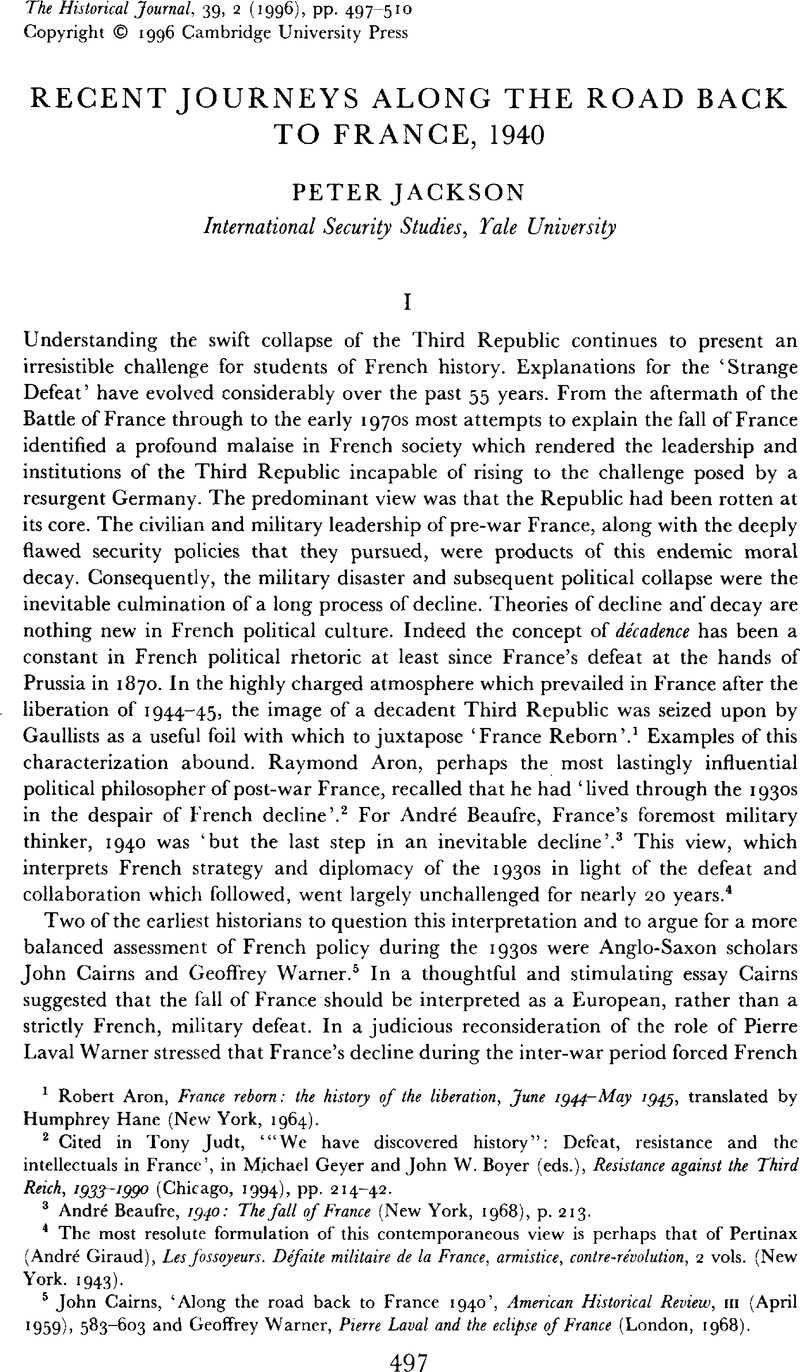Article contents
Recent journeys along the road back to France, 1940
Published online by Cambridge University Press: 11 February 2009
Abstract

- Type
- Historiographical Reviews
- Information
- Copyright
- Copyright © Cambridge University Press 1996
References
1 Robert, Aron, France reborn: the history of the liberation, June 1944–May 1945, translated by Humphrey, Hane (New York, 1964).Google Scholar
2 Cited in Tony, Judt, ‘“We have discovered history”: Defeat, resistance and the intellectuals in France’, in Michael, Geyer and John W., Boyer (eds.), Resistance against the Third Reich, 1933–1990 (Chicago, 1994), pp. 214–42.Google Scholar
3 André, Beaufre, 1940: The fall of France (New York, 1968), p. 213.Google Scholar
4 The most resolute formulation of this contemporaneous view is perhaps that of Pertinax, (André Giraud), Les fossoyeurs. Défaite militaire de la France, armistice, contre-révolution, 2 vols. (New York. 1943).Google Scholar
5 John, Cairns, ‘Along the road back to France 1940’, American Historical Review, III (04 1959), 583–603Google Scholar and Geoffrey, Warner, Pierre Laval and the eclipse of France (London, 1968).Google Scholar
6 Robert J., Young, In Command of France: French foreign policy and military planning, 1933–1940 (Cambridge, Mass., 1978)Google Scholar and Jeffery, Gunsburg, Divided and conquered: the French high command and the defeat of the West, 1940 (Westport, 1979).Google Scholar
7 Jacques, Néré, The foreign policy of France, 1919–1945 (London, 1975)Google Scholar and Pierre, Le Goyet, Le mystère gamelin (Paris, 1975)Google Scholar. Colonel le Goyet has since reversed field somewhat to produce a strident condemnation of French policy during the Sudetenland Crisis of 1938 in Munich, ‘un traquenard’? Pouvait-on et devait-on fait la guerre en 1938? (Paris, 1988).Google Scholar
8 ‘France sous le gouvernement Daladier, d'avril 1938 à septembre 1939’, Colloque, Paris, 1975. Published as Edouard Daladier, chef du gouvernement and La France et les Franfais en 1938–1939, René, Remond and Janine, Bourdin (eds.), (Paris, 1977 and 1978 respectively).Google Scholar
9 Robert, Frankenstein, Le prix du réarmement français, 1935–1939 (Paris, 1982)Google Scholar; Robert, Doughty, The seeds of disaster: the development of French army doctrine, 1919–1939 (Hamden, 1985)Google Scholar; idem, The breaking point: Sedan and the fall of France, June 1940 (Hamden, 1990)Google Scholar; Maurice, Vaïsse and Jean, Doise, Diplomatic et outil militaire, 1871–1991 (2nd edn, Paris, 1991)Google Scholar and Jean-Louis, Crémieux-Brilhac, Les français de l'an 40, 2 vols: Vol. I, La guerre: Oui ou non? Vol. II, Ouvriers et soldats (Paris, 1990).Google Scholar
10 A more detailed (but also more narrowly focused) treatment of French politics during the ‘Phoney War’ which reaches many of the same conclusions is Hans-Jürgen, Heimsoeth'sDer zusammenbruch der dritten Französischen Republik (Bonn, 1990).Google Scholar
11 Pierre, Rocolle, La guerre de 1940: les illusions (Paris, 1990)Google Scholar and Piotr, Wandycz, The twilight of French eastern alliances (Princeton 1988)Google Scholar. Less strident proponents of this interpretation are Henry, Dutailly, Les problèmes de l'armée de terre française, 1935–1939 (Paris, 1980)Google Scholar and Ladislas, Mysyrowicz, Autopsie d'une défaite: origines de l'effrondrement militaire français de 1940 (Berne, 1973).Google Scholar
12 Yvon, Lacaze, L'opinion publique française et la crise de Munich (Berne, 1991)Google Scholar; idem, La France et Munich (Paris, 1993)Google Scholar and Anthony, Adamthwaite, France and the coming of the Second World War (London, 1977).Google Scholar
13 Jean-Baptiste, Duroselle, La décadence: la politique étrangère de la France, 1932–1939 (Paris, 1979).Google Scholar
14 For two general studies of France during the 1930s which have appeared recently and which emphasise themes of decadence and decay see Serge, Berstein, La France des années trente (Paris, 1988)Google Scholar and Eugen, Weber, The hollow years: France in the 1930s (New York, 1994).Google Scholar
15 This approach to understanding the debate must not be confused with the ‘innen’ versus ‘aussen’ controversy which divides students of Nazi social, economic and foreign policy.
16 Georges, Soutou, ‘L'impérialisme du pauvre. La politique économique du gouvernement français en Europe Centrale et Orientale de 1918 et 1919. Essai d'interprétation’, Relations Internationales, VII (1976), 216–39Google Scholar; David, Kaiser, Economic diplomacy and the origins of the Second World War (New York, 1981)Google Scholar and Philippe, Marguerat, Le troisème reich et le pétrole roumain, 1938–1940 (Geneva, 1977).Google Scholar
17 France, Ministère de la Défense, Service Historique de l'Armée de l'Air, Series 2B, Carton no. 8, ‘Organisation, stationnement des unités de l'aviation lourde de défense’, May 1936.
18 There is an excellent survey of the state of the French army at the time of the Munich Crisis in the French parliamentary archives: France, Archives de l'Assemblée Nationale, Seizième Législature, Commission de l'Armée, ‘Contrôle des fabrications d'armement: rapport de M. Camille Fernand-Laurent’, 25 October 1938.
19 France, Ministère de la Défense, Service Historique de l'Armée de Terre [hereafter SHAT], 7N 2638-2, ‘Note sur les projets allemands en Europe Centrale’, 18 August 1935.
20 SHAT, , Fonds gamelin, IK 224–7Google Scholar (supplementaire), ‘Tchécoslovaquie’.
21 This collection is held in series 2N and 6N of the Service Historique de l'Armée de Terre.
22 It is worth noting that French military doctrine complemented this vision of the next war entirely. The army planned to fight the kind of highly structured methodical battles characteristic of a long war of attrition.
23 Taylor, A. J. P., The struggle for mastery in Europe, Pbk. edn (Oxford, 1971), p. 569.Google Scholar
24 This is the argument advanced by Munholland, J. K. in ‘Between the Popular Front and Vichy: The decree laws of the Daladier Ministry, 1938–1940’, Proceedings of the Twelfth Annual Meeting of the Western Society for French History (Lawrence, 1986), p. 288.Google Scholar
- 3
- Cited by




